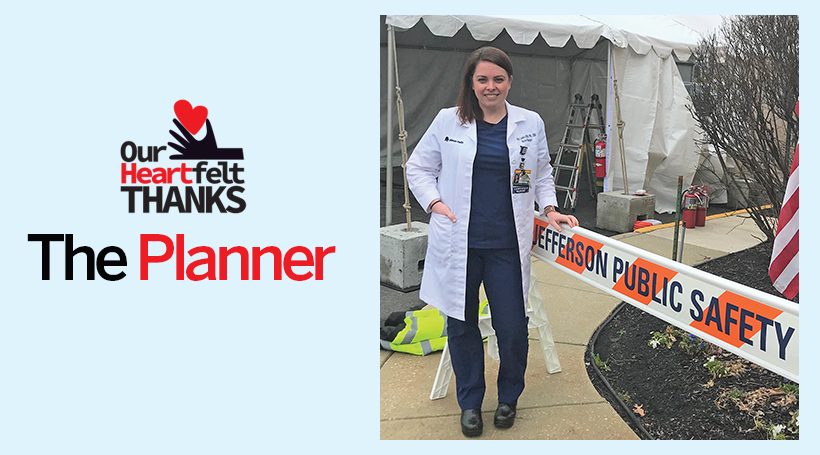Despite the intense training everyone working in a hospital emergency department receives, some things just can’t be planned for.
“No tools or training could have prepared us for COVID-19,” says Amy Lewis, nurse manager of the emergency department at Jefferson Washington Township Hospital. “We never thought we’d see so many sick patients coming in at the same time, using the same resources, battling something we know nothing about.”
Lewis manages more than 160 ER nurses, technicians and secretaries. Three months ago, she was performing the usual tasks of her job, and focusing on new plans and ideas for her workplace. But mid-March brought a seismic shift.
“All future projects shut down while we figured out ways to ensure the safety of our
patients and staff – and fast,” says Lewis, who worked as an ER nurse for 12 years before moving into leadership. “Changes and decisions now come on a day-to-day, hour-by-hour basis.”
Those changes and decisions – and their consequences – are crucial to ensuring positive outcomes in the ER. Having enough nurses, supplies and protective equipment to battle an ever-fluctuating number of cases helps to make sure patients – and staff – make it home to their families safely. For Lewis, that meant careful and quick decisions, like dividing the ER to separate COVID-positive patients from other patients.
The most severe COVID-19 cases go to the “hot zone,” and larger resuscitation rooms have been repurposed as COVID evaluation centers. Every patient – no matter why they came in – is tested. Since the hospital is on lockdown, instead of friends and family, it’s the ER workers at patients’ bedsides offering comfort and communicating with their loved ones.
“We’re passionate about helping people, but it’s emotionally straining,” Lewis says. “There’s a lot of anxiety. We’re working overtime but feeling like nothing we do is enough.”
At the end of the day, she says, they just want everyone to be safe.
“Nurses, technicians, doctors, respiratory therapists – everyone has each other’s backs, whether it’s stepping into a short-staffed department or helping someone fix their protective equipment,” adds Lewis. “Health care workers are the front line. We are trained to handle anything that comes our way, and it’s our time to step up.”













